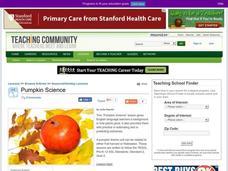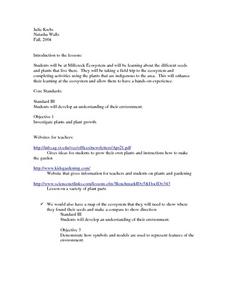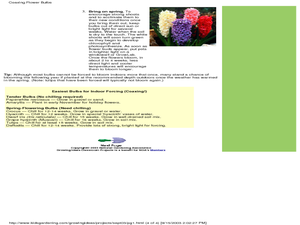Curated OER
Go Fish!
Students are introduced to the culture of the Kumeyaay. Using their text, they discover how they used their native flora and fauna in San Diego. They participate in a matching game and examine the types of organisms who make their home...
Curated OER
Exploring Texture In the Garden
Students explore the garden environment. In this garden environment instructional activity, students investigate the needs and parts of a plant. Students discover the differences between fruits and vegetables while creating their own...
Curated OER
Multicultural Literature Lesson Plan The Lotus Seed by Sherry Garland
Sixth graders begin reading "The Lotus Seed" before determining a plant that is a representative of their country or region. They illustrate the plant and write sentences about it and locate the region on a map. Finally, they make a...
Curated OER
Pumpkin Science
Students investigate how plants grow by analyzing pumpkins. For this agricultural lesson, students read The Biggest Pumpkin Ever by Steven Kroll, and draw pictures of a pumpkin in each of its growing stages. Students measure and dissect...
Alabama Learning Exchange
The Amazing Antigravity Stem
Second graders investigate how the stem of the plant carries water and minerals upwards from the roots to other parts of the plant. They observe what happens after a flower is placed in dyed water. They word process their observations...
Curated OER
The Living Environment
Fourth graders make a chart of animals and plants that live in either the desert, the ocean, or the tundra. In this environment lesson plan, 4th graders work in groups to discover characteristics needed for these animals to live in that...
Curated OER
Seed Detectives
Students examine seed coats. In this biology lesson, students look at pictures of magnified seed coats, then use hand-help magnifiers or microscopes to look at seed coats on their own.
Curated OER
English Exercises: Furniture and Rooms
In this online interactive English worksheet, learners respond to 25 fill in the blank questions that require them to use English vocabulary appropriately. Students may submit their answers to be scored.
Curated OER
Ecosystem Field Trip
Students investigate the different seeds and plants that are part of the Millcreek ecosystem. They take a field trip to the ecosystem and complete activities using the plants that are indigenous to the area.
Curated OER
Plant Growth
Third graders keep a journal and record the growth of their plant everyday over a two week period. With an observation written down for everyday of the week, they draw a picture of their plant in their journal on Monday and Friday...
Curated OER
Vegetation Scavenger Hunt
Pupils use picture cards to familiarize themselves with plant structures and characteristics. They collect plant specimens without destroying the plant and mount them creating a class herbarium.
Curated OER
Coaxing Flower Bulbs
Students complete an experiment for coaxing flower bulbs into growth. In this flower growth lesson, students research various types of flower bulbs that may be used to complete a coaxing experiment. Students then complete a flower...
K5 Learning
Multiplication Word Problems #3
How many people can ride a Ferris wheel with 14 seats, each of which holds 6 people? Learners assess this and four other multiplication word problems, and are encouraged to show their work. They use double- and triple-digit numbers, and...
Curated OER
PLANT PARTS WE EAT
Students identify an assortment of vegetables and learn how to locate the parts humans use for food. Students identify the plant parts we eat. Students color the pictures on their worksheets as provided. Students match the plants to the...
Curated OER
Co-evolution of Plants and Pollinators
Young scholars, while studying the rolls of pollinators and plants, explore co-evolution of mutualistic relationships.
Curated OER
Ecosystems - Plants and Animals Together
Students study the biotic and abiotic factors of an environment. For this exploratory lesson students examine the different trophic levels and how organisms are connected.
Curated OER
Classified Information - Part 1: Shapes
Third graders investigate how and why scientists use classification. They discuss classification strategies using animals, and as a class fill in a flowchart with their responses. Next, in small groups they cut out a variety of shapes...
Curated OER
Logs of Straw: Dendocronology
Students investigate the age of trees by analyzing tree rings. In this dendocronology lesson plan, students examine sample images of tree rings and identify their age by the amount of rings. Students complete a chart...
Curated OER
Biomes -- Part II
Students use the internet to gather information on the biomes of the world. They identify the climate and unique characteristics of each biome along with any threat to them. They create their own campaign to preserve wildlife.
Curated OER
Plants
First graders learn the basic needs of plants, label the major parts of a plant and name their uses. They also use a KWL chart.
Curated OER
Plants
In this science worksheet, students investigate plants by first reading a paragraph of information. Students then choose a plant, illustrate and write about it.
Curated OER
What Do Plants Need to Grow?
Students in an ESL classroom identify the necessary requirements plants need to grow. Using Spanish worksheets, they label each part of a plant and state their function. They are given cutouts of a picture and the Spanish word in which...
Curated OER
Plants
Students plant bean seeds and draw pictures of the plants as they grow. They create their own garden, plant the seeds, and keep a journal of their growth.
Curated OER
Life Cycles of Plants
Students discover the general life cycle of a plant, the parts of a plant, and what it needs to grow. They plant bean seeds and discuss the parts of a plant and what it needs to grow.























